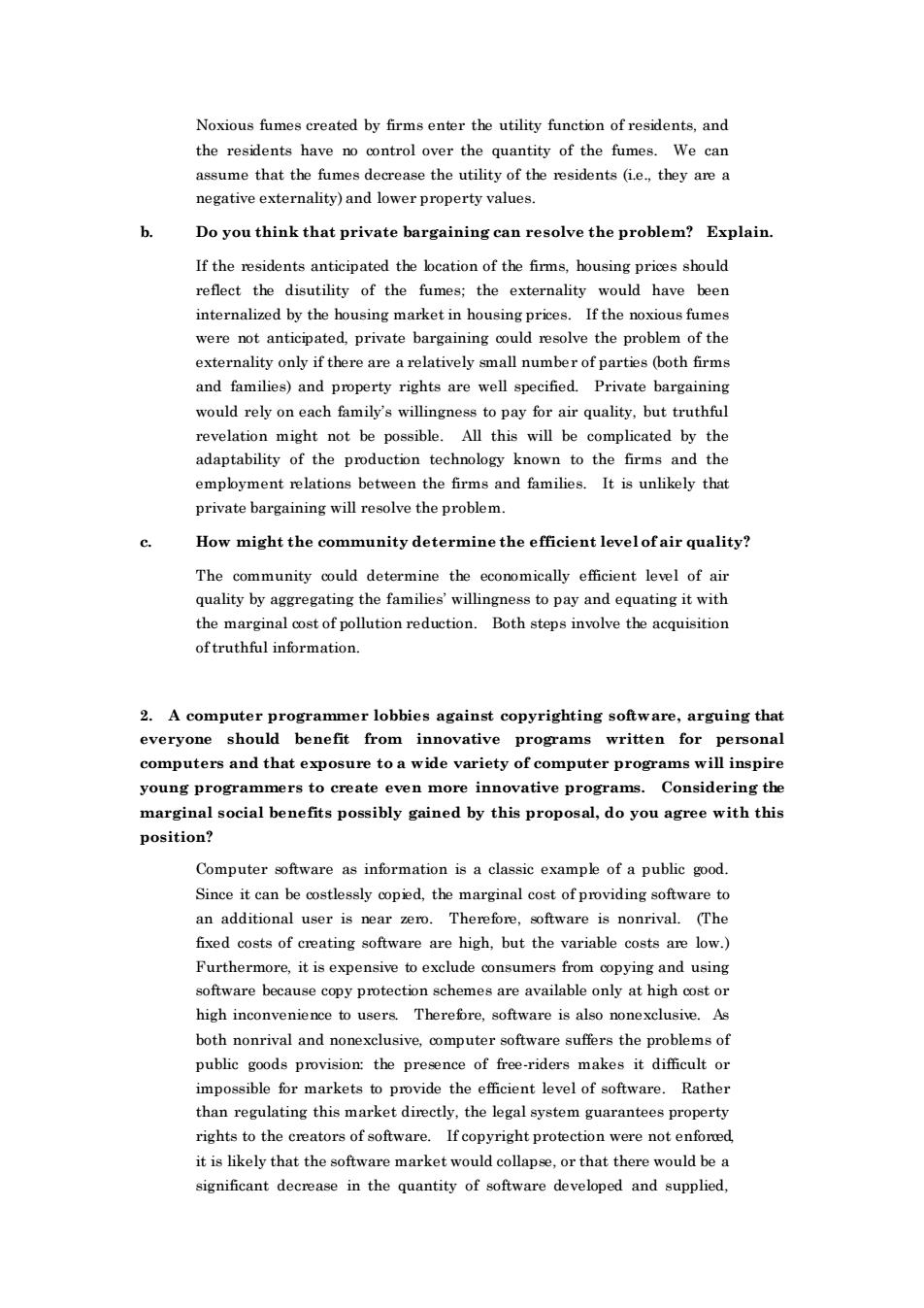正在加载图片...

Noxious fumes created by firms enter the utility function of residents,and the residents have no control over the quantity of the fumes.We can assume that the fumes de ecrease the utility of the residents(ie.,they are a negative externality)and lower property values Do you think that private bargaining can resolve the problem?Explain If the residents anticipated the location of the firms,housing prices should reflect the disutility of the fumes;the externality would have been internalized by the bousing market in housing prices.If the noxious fumes ,private bargaining probem of the externality only if there are a relatively mall numbe and families)and property rights are well specified.Private bargaining would rely on each family's willingness to pay for air quality,but truthful revelation might not be possible.All this will be complicated by the adaptability of the production technology known to the firms and the employ ent relations between the firms and families.It is unlikely that private bargaining will resolve the problem. How might the community determine the efficient level ofair quality? The community oould determine the economically efficient level of air quality by aggregating the families'willingness to pay and equating it with the marginal cost of pollution reduction.Both steps involve the acquisition oftruthful information 2.A computer p everyon homh四copyrigh地飞a5gaig少” aovati program for perso computers and that exposure to a wide variety of computer programs will inspir young programmers to create even more innovative programs.Considering the marginal social benefits possibly gained by this proposal,do you agree with this position? Computer software as information is a classic example of a public good. Since it can be coped.the ng sofiware to an additional user is near zero.Therefore,software is nonrival.(The fixed costs of creating software are high,but the variable costs are low. Furthermore,it is expensive to exclude consumers from copying and using software because copy protection schemes are available only at high cost or high inconvenience tousers nonexclusive.As both nonrival and nonexe usive,computer software suffers the problemsof public goods provision:the presence of free-riders makes it difficult or impossible for markets to provide the efficient level of software.Rather than regulating this market directly,the legal system guarantees property rights to fware.If copyright were it is likely that the softwar re market would or that there would be significant decrease in the quantity of software developed and supplied. Noxious fumes created by firms enter the utility function of residents, and the residents have no control over the quantity of the fumes. We can assume that the fumes decrease the utility of the residents (i.e., they are a negative externality) and lower property values. b. Do you think that private bargaining can resolve the problem? Explain. If the residents anticipated the location of the firms, housing prices should reflect the disutility of the fumes; the externality would have been internalized by the housing market in housing prices. If the noxious fumes were not anticipated, private bargaining could resolve the problem of the externality only if there are a relatively small number of parties (both firms and families) and property rights are well specified. Private bargaining would rely on each family’s willingness to pay for air quality, but truthful revelation might not be possible. All this will be complicated by the adaptability of the production technology known to the firms and the employment relations between the firms and families. It is unlikely that private bargaining will resolve the problem. c. How might the community determine the efficient level of air quality? The community could determine the economically efficient level of air quality by aggregating the families’ willingness to pay and equating it with the marginal cost of pollution reduction. Both steps involve the acquisition of truthful information. 2. A computer programmer lobbies against copyrighting software, arguing that everyone should benefit from innovative programs written for personal computers and that exposure to a wide variety of computer programs will inspire young programmers to create even more innovative programs. Considering the marginal social benefits possibly gained by this proposal, do you agree with this position? Computer software as information is a classic example of a public good. Since it can be costlessly copied, the marginal cost of providing software to an additional user is near zero. Therefore, software is nonrival. (The fixed costs of creating software are high, but the variable costs are low.) Furthermore, it is expensive to exclude consumers from copying and using software because copy protection schemes are available only at high cost or high inconvenience to users. Therefore, software is also nonexclusive. As both nonrival and nonexclusive, computer software suffers the problems of public goods provision: the presence of free-riders makes it difficult or impossible for markets to provide the efficient level of software. Rather than regulating this market directly, the legal system guarantees property rights to the creators of software. If copyright protection were not enforced, it is likely that the software market would collapse, or that there would be a significant decrease in the quantity of software developed and supplied